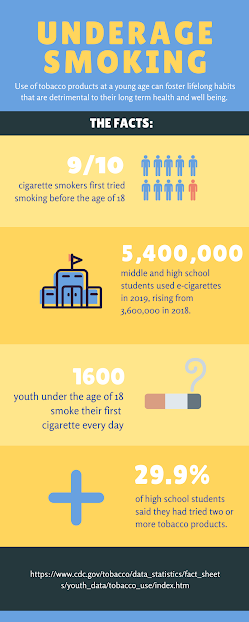U.S. new law says “NO” to underage smokers
April 7, 2020
 The epidemic regarding the use of tobacco among teenagers has recently started to increase as a result of tobacco becoming accessible to adolescent groups. Despite a various number of efforts from organizations such as thetruth.com and more about the negative effects behind smoking, many teens today still ignore the facts.
The epidemic regarding the use of tobacco among teenagers has recently started to increase as a result of tobacco becoming accessible to adolescent groups. Despite a various number of efforts from organizations such as thetruth.com and more about the negative effects behind smoking, many teens today still ignore the facts.
Since tobacco has become easily attainable among the younger generation of adults, reports have shown that high numbers of students begin to smoke before the age of 18. According to the American Lung Association, almost 2,500 children under the age of 18 try their first cigarette every day, and more than 400 of them will most likely grow an addiction and habit of smoking daily. Research proves the negative effects behind the use of tobacco and how it can affect adolescents in their development, especially since teenagers’ brains are not fully developed until the age of 25 as stated in Big Think website.
“Brain development has been affected by tobacco, it can stunt or slow brain development, it’s very costly, it’s you know, bad habits,” Anatomy & Physiology teacher Kali Gomez said. “It causes issues with teeth and throat, and lungs and breathing, it’s linked with asthma and being able to play sports and being able to function and do activities.”
The alarming rate of youth starting to using tobacco-based products, as reported by Senate Majority Leader Mitch McConnell cited in the Verge, has led the U.S. to enforce a smoking law, that California initiated in 2016, in which the minimum age for cigarettes would be raised from 18 to 21. This act would come to include products that contain nicotine, such as tobacco, vapes, cigarettes, etc. When this new law came out, it evoked lots of positive feedback from the Mater Dei community.
“This is a good thing. The law should have a positive impact by reducing the rates at which minors are using nicotine products,” Assistant Principal of Student Services Miguel Gutierrez said.
“I like it. I think it’s needed. I think 18 is too young,” Anatomy & Physiology teacher Kali Gomez said. “I think it makes it a little bit more difficult to get tobacco, you can’t walk into the store quite as easily.”.
As the new law on nicotine products is one way to protect youth, the school has taken further steps. One way being through random drug testing. As stated in the Mater Dei Parent-Student handbook, a particular student will be chosen by the principal or random selection each month. The purpose of the drug testing program is to empower students to reject nicotine products when it comes to peer pressure, according to Gutierrez.
“I think that’s great, I think the more we can do from our regulatory perspective to help prevent getting cigarettes or vaping in the hands of young teens, [the better] ” school nurse Shannon Brown said.








